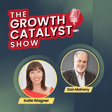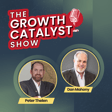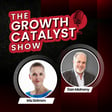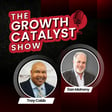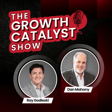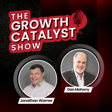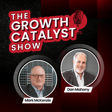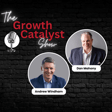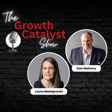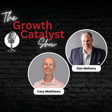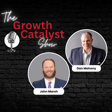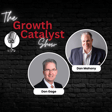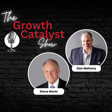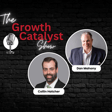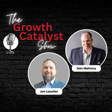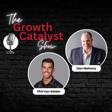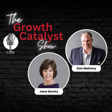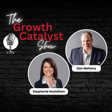Become a Creator today!Start creating today - Share your story with the world!
Start for free
00:00:00
00:00:01

Dan Mahony, 8 min Elevate Your Business: Insights from Richard Kirby's Coaching Expertise
Richard Kirby is a highly experienced business coach and founder of Decision Point Executive Coaching, who has helped businesses and leaders unlock their full potential over a 40-year career. Richard shares his unique perspectives on the power of self-belief, goal setting, and the balance between inspiration and analytics in pursuing success. Learn how Richard's coaching methodology has transformed the lives of numerous professionals, facilitating career advancements and fostering work-life balance.
Transcript
Introduction to The Growth Catalyst Show
00:00:00
Speaker
Welcome to The Growth Catalyst Show, where we believe that growth can come in many forms, professional, personal, company, sales, you name it. I'm your host, Dan Mahoney, founder of Transcendent Sales Solutions and a guide to a world of growth possibilities. I've spent my career empowering companies and their people with strategies that accelerate growth.
00:00:18
Speaker
I'm here to bring you stories of these business leaders and their trusted advisors to gain insights into their journeys and learn how they fueled their own growth. Just maybe their journey could become part of your own growth story. Are you ready? Let's grow.
Meet Richard Kirby
00:00:34
Speaker
Welcome to the next edition of The Growth Catalyst Show. I'm your host, Dan Mahoney. And my next guest is Richard Kirby. He is the founder of Decision Point Executive Coaching. He has a 40-year track record of helping businesses and leaders unlock their full potential to succeed. Richard also serves as a chair of a peer group of business owners for VISTAs worldwide. Richard, welcome to The Growth Catalyst Show.
00:00:57
Speaker
Thank you, Dan. I'm happy to be here. Thank you for your time.
Richard's Roots and Journey to Atlanta
00:01:00
Speaker
Yeah, thank you. I'm excited to learn a little bit more about Richard Kirby. So doing my show prep, am I going to make an assumption you are from Louisiana, potentially?
00:01:11
Speaker
Uh, born in Texas. So once you're born in Texas and they sign and never let you go, you know, you're a Texan for life, but, uh, grew up in Louisiana. And so, yeah, I would consider Louisiana home, but I've been in Atlanta for 35 years. So this is my probably final home. We call that pre Olympics, right? Yes. Pre 1996. So, and Atlanta was a lot different back then, I'm sure.
00:01:38
Speaker
Yes, it was. I moved in 86, 10 years before. And was the traffic, is it bad? Is it 86 as it is in 2024?
00:01:46
Speaker
You know, it cycles a little bit up and down, but basically they get to where it's, it's kind of unbearable. And then they approve the roads and then it grows again and gets unbearable again. So it goes through cycles like a lot of things in life. So it depends on what year you pick as to how the traffic is.
From Engineering to Management: Seeking Growth
00:02:04
Speaker
So I thought you might've grew up in Louisiana cause you went to Louisiana State University and you started out with a degree in engineering management.
00:02:14
Speaker
Well, actually an electrical engineering degree for my undergrad at Louisiana Tech, which is in North Louisiana. And then I moved to South Louisiana. And when I was in South Louisiana, I got an associate degree or certificate or whatever in engineering management.
00:02:33
Speaker
thinking that might be helpful to grow my career. So back then, what were you thinking as far as starting with engineering and starting with an electrical engineering background? What was kind of the goals for you? The goals of my life predominantly have always been to find something I enjoy, which offers additional opportunity of advancement, income, or something other valuable for my life.
00:03:02
Speaker
So I didn't have a specific goal like I want to be president of a such and such or anything. But it was so I went to did the engineering management stuff, figuring, you know, I'd been doing engineering jobs and done some management, but I thought maybe an additional credential would be helpful.
00:03:21
Speaker
For the growth, this is a growth show. You talk about growth of companies, which also obviously growth of individuals in a sales organization or any other is important for the growth of the entity.
00:03:35
Speaker
Well, and you had, and you had various roles over your career. And I saw some in the sales director, training and development manager, and of course, engineering manager, you know, talk about some of those roles and, you know, like to learn how those maybe influenced your approach and what you're coaching and what you do.
Transition to Coaching: Developing People
00:03:57
Speaker
Well, I would say certainly in management, whether it was engineering or any of them, I think you're always looking to assess how your people are doing and how the team is performing as a group and where there's need for improvement, as well as, of course, acknowledging the good things that are going on, especially
00:04:20
Speaker
And so, I don't know, it was sort of just a natural part of being a new manager to me, that coaching was part of it. Without any real training, even in the engineering management course, it was more classical management, not really coaching.
00:04:40
Speaker
So it was sort of whatever came up, whatever I thought I needed to do to help a person or counsel a person or motivate a person was it was very natural, unstructured and unplanned. You might say my coaching. And then when I got out of corporate America and basically wanted to say, I am a coach,
00:05:02
Speaker
That's more like an occupation as opposed to a piece of a management role. So I got more focused on coaching as a discipline. So what would you say is your most impactful corporate position you had? I mean, you had many of them. What would you say the most impactful one was for you?
00:05:22
Speaker
Most impactful for me in terms of enjoyment, not an early growth of myself was the training and development. I loved it. And that sort of, it really ties in the idea that your coaching is pure and all you're doing is coaching.
00:05:38
Speaker
And there's no consulting or training or other things, you know, coaching in my mind. And I'm probably more this way than most people because I did four years in training. Now that's impactful to me in that I feel that, uh,
00:05:55
Speaker
part of coaching is educating, right? Everybody doesn't know everything. So if I, if I ask you what, Hey, Dan, what would you do in this situation? What do you think we should do? Depending on your level of knowledge and experience and perspective, you may give me really great answers. You could give me some kind of lousy answers. So sometimes coaching needs, in my opinion, education,
00:06:22
Speaker
and even consult a consultative input, like, you know, here's some ideas I have about options you should consider. So I sort of see coaching, education and consulting or advising as sort of all being this all being in the same bundle in a way. But you have to call yourself something if you put too many words, people get confused. So if you do something like coach, you start there.
00:06:51
Speaker
And you know, there is a big difference between coaching and training. Yes. And some folks don't see that. I think that coaching is many times
00:07:05
Speaker
put in a bubble without those other things. And many times when you do, when you get trained in coaching, now we're going to reverse this thing. When you get trained in coaching, it is more pure coaching. And, uh, the, the things that my mind are interrelated and they can help each other. What do you do when, what's the situation, you know,
00:07:33
Speaker
as to what mode you might think of it as modalities, as you're saying. Are you training? Are you coaching? Are you consulting and advising? And I go between now and very, I can have a conversation for 20 minutes and I just kind of pop into whatever perspective seems right at the time where the conversation is.
00:08:00
Speaker
Yeah, I'm not saying I'm great at that. I've solved that problem and I have a perfect formula for it. I'm just really saying how I interact with clients. Well, and I think of it in relates to sales, you know, for example, when you're out training your sales team, you're sometimes
00:08:19
Speaker
in training and a lot of times the philosophy is I'm going to show you how to do it versus coaching is I'm going to advise you how to do it. Because I can't tell you how many times I work with managers when I was training for a new job. All right, let's go and just watch what I do. And you know, you spend four days just watching them what they're doing really didn't learn anything.
00:08:41
Speaker
Well, you, you learned a little bit about how they did it. Exactly. They do it. And you may not, but you probably are not the exact same person as they are. Everybody's unique. So they may be doing something that you find very uncomfortable that you need to get over and learn to do it. And they may be doing something that just comes across as insincere and you can't do it.
Starting a Coaching Practice After Downsizing
00:09:06
Speaker
So what was the point in your corporate career when you decided, you know what, I'm going to break out on my own and I'm going to take this coaching I'm doing for corporate. I'm going to put it into a business for myself.
00:09:19
Speaker
Well, I was given an opportunity to reassess my career in the 2001 recession when I spent my whole corporate career in telecommunications. And for those of that that didn't spend their whole career there, there was kind of the dot com bubble.
00:09:38
Speaker
which telecommunications rode in the late 1990s going to 2000 and when the 2001 recession hit it went from feast to famine and so I was I always like to say in my own defense the day I was let go out of my sales director job I was 167 percent of my year-to-date objective
00:10:02
Speaker
Why did I get let go? Well, I was the highest paid person in the organization, and they gave my boss a piece of paper and said, had people's names and a dollar amount by each one and said, you're going to have to live with your decision, so cut this many million dollars out of your budget.
00:10:24
Speaker
And I always, I would have done the same thing he did. I would have let me go. Even though I was a high performer, I was really expensive and he had to cut his budget. So I got downsized. So, uh, I went through a short period of time, maybe up to six months where I was assessing, do I want to go back to corporate America and fight it out in my, in my industry?
00:10:48
Speaker
which is which is really shrunk or do I want to go to a new industry or do I want to do something totally different? And I came to the conclusion after a few months, I want to do my own thing. And so I found that I had been trying to educate myself
00:11:09
Speaker
in how to better navigate the corporate life and more for myself, but secondarily to coach my employees. So I said, you know, I think I would enjoy this and I could see that one on one result dealing with an individual as opposed to being part of a big corporation. So that's what happened. Basically, I had an opportunity to go back and find a new job or go out on my own.
00:11:39
Speaker
And, you know, and then you go on your own and we always remember our first client, you know, that we had when we got our own. Tell me a little bit about your first client when you finally got that first one.
00:11:51
Speaker
Well, I remember my first three clients. You gave me a little background on how I did it though. I researched and I found, okay, there are these two or three national organizations for coaching. And if you want to do it the standard way, like people say, I'll go to college, spend four years, spend all this money and come out with a degree. Well, in coaching, it was like you spend six months or a year and this much money and here's the program and you follow their program and you get your sort of certification.
00:12:20
Speaker
And I've always tended to be a I'll think of the word in a minute. I have a word I use, which people don't use very often of how I identify myself. Basically, I don't follow. I don't follow the standard path. Right. I was like, I could spend six months or a year and whatever it was, five thousand bucks and come out with this.
00:12:47
Speaker
What else could I do? So what I decided to do was I found a person who had been coaching for 20 years and was successful. And I said, I want to pay you to teach me
00:13:02
Speaker
everything you know that you've learned in 20 years. So when I start my coaching practice, I'll have 20 years of knowledge and strategy to start my practice. So I need to make this short because I have an issue. No, please.
00:13:17
Speaker
But the point being, I spent one month with him. I paid him $30,000 instead of the $5,000 to go through the year program. And in 30 days I had a coaching practice up and running. So you could do the math on how much more money, how much I paid and you know, all that. But the point being very first.
00:13:37
Speaker
clients I had. I felt comfortable. I knew what I was doing and I was able to be successful and help them. So my first client was somebody I met through a networking meeting and they were going through a career change and they said, you know, maybe you could help me. And my first coaching was individuals in coach and career change, which I still do a little of, but not a lot.
00:13:59
Speaker
Um, and he wrote me a check. I used to have it on my wall, $1,200. And okay, you're going to get me this many hours and you're going to, and what through the coaching, what he decided to do was actually go out on his own and become an independent consultant. He eventually became a visted share.
00:14:21
Speaker
But he, he went out and did business consulting and within a year or so, I mean, he was making more money than he was making, had been making in his sales job. And at the peak, a few years back, I mean, he was making 300,000 plus in independent coaching. So that was my first guy and it turned out good. The second one was a CFO of a small private company, like a,
00:14:47
Speaker
It was maybe a $50 million private company. He got a job as CFO of a $1.2 billion publicly traded company. He never worked for a publicly traded company, which was amazing. And then my third client was an independent. Now we're going in reverse.
00:15:09
Speaker
an independent consultant who had been consulting in marketing if I wanted to find a full time job. So you see, this is just the flip of my first client. And he got a, his first ever president job with actually with a company called Gerber life insurance, which is a split off of the baby food. And he eventually became CEO and chairman of the board.
00:15:33
Speaker
of that company, publicly public, uh, multi hundred million dollar company. So that was my first three clients. So kind of gave me a little confidence and knew what I was doing. Yeah. I mean, you get three all at once. I mean, most people would say, Oh my God, what am I going to do? But you know, it's, it's, it's amazing. You, you, you spent the extra money where coming off of being downsized, you didn't have that money, but you did it. And it was probably one of the best investments you ever made.
00:16:02
Speaker
Well, and I want to challenge what you said just a little bit is that a lot of people say what you said. You didn't have the money. And I have found that that a lot of people when I more of the career advising, I'm a $250,000, $300,000 a year executive, right? I got all this money stacked everywhere, you know, and then I lose my job. All of a sudden, I don't have any money. Well,
00:16:28
Speaker
I had several hundred thousand dollars. Okay. $30,000 wasn't going to make or break me, but a lot of people have that spin thrift attitude. Today I'm an executive. I'm making $300,000 a year. Life's wonderful.
00:16:45
Speaker
I get laid off. Uh-oh. I'm in the poor house. I got to cut my cable TV. That's $125 a month. So I, that is, uh, I'm a, uh, definitely a different thinker than that. I think, you know, if you do have, if you know, some people don't have assets, but if you have assets just cause you lost your job, that doesn't mean you're broke. It just means you're not getting revenue in consistently.
00:17:12
Speaker
Well, and a lot of people who make $300,000 a year spend like they make 400 a year and that's the problem. That's true. That's true. That's true. So anyway, that was, uh, I started off, so that really made me feel very confident.
00:17:30
Speaker
And I've been confident since almost the first month I started my... They're in the problem with me not feeling confident I can help the client. The challenge is the confident, you're in sales making that buying decision that they trust themselves enough to make that investment. Well, you speak of confidence.
Unlocking Potential and Building Confidence
00:17:50
Speaker
I know that's something that I've read in my readings about who you emphasize quite a bit in your coaching, is having that self-confidence.
00:17:59
Speaker
Absolutely. I believe pretty much everybody, I go around telling people this, I don't know if they think I'm crazy, but I believe everyone, and this is not literally okay when you say something, it's not 100%, but I believe everyone is underutilized.
00:18:16
Speaker
That means they're not making enough money. They're not using all the talents they have. They're not in the right position to be able to leverage those talents and things like that. I think everybody's underutilized and they can always make another step or many steps forward to help themselves, to help their organization and things like that. One of the things I read too is a success formula you had written.
00:18:44
Speaker
Inspirational plus analytical equals inedible. Yeah. That came from a marketing. I engaged in a marketing company. Good. That's great. It sounds great. Tell us about it. Thank you. Nobody, you're the only person who's mostly ever asked me about that, but you talked about having that self confidence. So the inspiration, so I view that two key parts of what I do is inspirational. Inspirational is you have to believe in yourself.
00:19:12
Speaker
And you have to believe in your abilities. You have to know your limitations. I'm not going to go on the pro tennis circuit or something and win any tournaments against any of the pro tennis players. But within the limits of your business or other abilities,
00:19:30
Speaker
you have to develop confidence. And so I work with people on that. So that's the inspirational part. And you get them thinking aspirational about what they can do. And then the second part is the analytical, which is more of the kind of throwback to the engineering.
00:19:49
Speaker
idea of when someone opens their mouth and tells me here I have this problem or this isn't working I'm like okay let's roll up our sleeves and come up with the solution so
00:20:02
Speaker
Get them enthused, get them positive about themselves, take better account of their abilities, and then analyze what's going on and come up with a good strategy to solve anything they see as roadblocks or things that are preventing them from getting where they want to go.
00:20:23
Speaker
If we look at the business owners you work with, what are some of the common challenges you see across the board that many of them are facing that might be getting in the way of their growth?
00:20:34
Speaker
Let's take a moment for a quick word from our sponsor. This episode of The Growth Catalyst Show was brought to you by Transcendent Sales Solutions. Whether your company is facing uncertainty, declining sales, or resource limitations, Transcendent Sales has the solution. Their team has decades of experience helping businesses find alignment to meet their growth goals and transforming underperforming sales organizations into revenue producing market leaders.
00:20:58
Speaker
They take a hands on results oriented approach to solving sales challenges. Visit transcendence sales.com to learn more and subscribe to the biweekly growth catalyst newsletter for insightful growth strategies. Transcendence sales solutions, empowering businesses to reach new heights. And now back to the show.
Challenges in Business Growth
00:21:17
Speaker
Uh, one of them would be allocation of time.
00:21:22
Speaker
The small business owners are notoriously known as putting out fires, you might say, or I call it, you go to work and get on the durable wheel and you just sit there down in the weeds or whatever. And so I think allocate, what do you spend your time on? So I try to get business owners to move away from the more mundane, the more basic, something that can be delegated.
00:21:49
Speaker
And I have a specific process for that. And like I believe everyone generally utilize, I believe every business owner can get rid of at least 50% of their workload in a reasonable amount of time. So my goal is like, let's get rid of 50% of your workload. And then as it's going away, let's start doing things that are more analytical, strategic, forward-looking, impactful,
00:22:18
Speaker
Project-based here's a we never get around to these things. Okay, let's start identifying the things that aren't getting attention so I'd say time allocation from as they say in vestige we all say Stop working so much in the business and work more on the business. So that's like where do you put your time? I think another one is
00:22:41
Speaker
critical issues or things that need to get looked at that are getting pushed off like that, a failure to identify them or raise them to a high enough priority to take action on them. That would be another thing. Let's see, what else? I guess having a vision and goals.
00:23:07
Speaker
You don't know how many business owners I talked to who've been in business 15 years and they're doing $1.5 million.
00:23:16
Speaker
And I sometimes, sometimes I'm a little overly challenging maybe, and it's not my best interest, but that's part of coaching. I go like, when you started this business 15 years ago, did you think I'm going to work my butt off and I'm going to do a great job and I'm going to deliver great products or services. And in 15 years, I'm going to be a $1.5 million company. With a salary and breaking even.
00:23:41
Speaker
Yeah. So I think that lack of goal setting or setting a goal and then always just resetting the goal back to the same goal you had last year because you're not making any progress. I think that's a failure to stop and look in the mirror and say,
00:23:59
Speaker
I'm not where I want to be. And so goals are important. And then, of course, well, it's a strategy or action plan to get to the goals. That's maybe three. Financial management might be a fourth. Obviously, most small business owners don't come from a financial management background.
00:24:21
Speaker
So when they start getting in cashflow probable or things like that, then they get a little bit more interested. I got to figure out why I don't have any money in the bank. What's a 13 week cash statement? Yeah. So, um, so those would be the four things that there's tons more, but I mean, if you really worked well on those four things, a lot of other things are going to come by incidental.
Achieving Work-Life Balance
00:24:48
Speaker
Richard, you have glowing reviews on your LinkedIn page for people that worked with you. And one of the things I picked up by reading them is you helped a lot of folks with that work-life balance. And as a business owner, you talk about working in the business and on the business, something I struggle with because I'm doing both at the same time. So how do you help with that and give some tips on, you know, how, how, how this could be addressed?
00:25:14
Speaker
OK, well, that's sort of an offshoot of what I said before. Item number one is like get out of working so much. It is on, as you said. And so that's time allocation. So if I'm too far into the business, then I don't have an option with.
00:25:31
Speaker
what else to do. So, for example, you know, I would say, you know, take out a piece of paper and draw a line down the middle and on the left hand side, write all the things that take up a notable amount of your time.
00:25:52
Speaker
I don't mean one hour every year but like what are things that seem to be recurring every month or every month or so or every day or week and that are absorbing your time and that stuff I think after you look at it's mostly working in the business and so all those items that are working in the business the next question is what can I do to get those off my plate?
00:26:16
Speaker
So that's kind of a very simple exercise and you say, well, okay, I did the exercise. Uh, I see how I could get 20 or 30% off my plate. How do I do that? Of course, to some extent you get a coach that helps you work through that, but a high level answer would be, uh, we had a speaker at our business group one time and he said, uh,
00:26:40
Speaker
You should never, you should never let it hold you back that you don't have enough money or enough people resources to go do what you need to do. Now, obviously that's not 100% true, but it was sort of that bias toward like you, you have an admin that helps you somewhat.
00:27:00
Speaker
Could that admin take over more? What's in that column for you, Dan? And could the admin take anything? Say, well, no, she specializes in X. OK, could you go get another admin that's a 1099 that does Y?
00:27:14
Speaker
And then could you go on Upwork or one of these websites and you have to do something that's not critical obviously. You don't want to outsource something that's critical that could critically fail your business if you're not sure about the person. The point of all of that was you can get things off your plate. The other thing besides outsourcing it or handing it off is also, is there anything on here I could just stop doing?
00:27:44
Speaker
And there's probably not much, but there might be one or two things that's kind of like, you know, I don't really even need to do this anymore. Like I'm doing this thing in marketing and it isn't working. Why do I keep doing that when it's not bringing me any leads? Maybe I just need to stop that until I figure out something else to do.
00:28:05
Speaker
either of your money or your time. So that gets you out of, so working somehow get you out of the business. Your time is valuable. If you can outsource it for $25 or $50 an hour and your time is worth $200 or $300 an hour, it's a good business proposition to be looking into.
00:28:26
Speaker
And then part of the time you recover, are you going to work on the business? Are you going to take some of that and allocate it in some other way to personal?
00:28:36
Speaker
My ideal guy went from working 60 hours a week in his small business to working 30 hours a week and taking vacations every quarter, a week or two, every quarter. And he used to jokingly say to our visage group, Richard made me take a vacation.
00:28:56
Speaker
I didn't make him. I just kept reminding him. He should take a vacation. Yeah. In terms of your work, life balance and things. Yeah, it's hard. Cause it's hard to turn it off. Once you're on, it's hard to turn it off and it's hard to get away from it.
00:29:11
Speaker
Well, there are people that are maybe not die hard, but are fairly workaholics and I have coached them and they seem to always keep coming up with something else. Like I say, okay, we get this off your plate. Now let's take a
00:29:27
Speaker
10 hours a week and devote to working on the business. And then you also need to take every other week or something, let's do something else with that. And you can't get them to do that because they won't let go of the work, but it can be done if the person wants to.
00:29:43
Speaker
Amen. That's one. You're absolutely right about that. This has been such an insightful conversation.
Episode Wrap-up and Contact Info
00:29:49
Speaker
I've learned so much from you and I'm sure everyone else did listening as well. If someone is interested in learning more about your coaching and how you might help them as an individual or business owner, what's the best way to get in touch with you?
00:30:02
Speaker
Well, as far as getting in touch with me, my cell number is 770-366-5875. They're welcome to text or call me. As far as an email, to keep it simple, I have a Gmail account. And because I'm an executive coaching, my email is executiveimpact.com.
00:30:25
Speaker
I-M-P-A-C-T, just put those two words together at gmail.com. And then I have a website, which is www.RichardCurvy.net. Excellent. Richard, I appreciate the insights you gave us today and I appreciate you also taking the time on The Growth Catalyst Show. You're very welcome, Dan. Thanks for having me and I've enjoyed it very much.
00:30:50
Speaker
And that's a wrap for today's episode of The Growth Catalyst Show. Remember, you can take these stories of growth and make them part of your own journey. Learn from them, draw inspiration, and let them guide your path of growth. I'm your host, Dan Mahoney, and I look forward to our next journey together. If you've enjoyed the show, please subscribe and leave a review. Until next time, keep growing.
